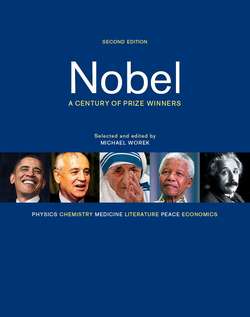Читать книгу Nobel - Michael Worek - Страница 5
На сайте Литреса книга снята с продажи.
The Prize
ОглавлениеThe idea of creating prizes to award individual artists and scientists for their efforts is rooted in the French Revolution. Throughout the 19th century there were plenty of awards given to academies, clubs and administrations, but it wasn’t until the second half of the century that private foundations began to bestow their own prizes.
What is it, however, that makes the Nobel Prize different from others and grants it the recognition and support it has today? First of all, as is very clear in Alfred Nobel’s will and contrary to other contemporary examples, it is a universal award, and there was no intention of benefiting a specific nation. Also to be noted is that Nobel did not create one prize but five (the sixth, for Economic Sciences, was only created in 1968.) The recognition offered by the prizes is, therefore, more complete, bringing together a diverse group of talents from fields that usually have little interaction. The most important point that distinguished the Nobel Prize from other awards, however, was the large sum given to the laureates. In addition to the prize money, a diploma and medal were also presented, which was not specified in Nobel’s will.
Although there is great importance in a scientist, writer or pacifist seeing their work published in consequence of being given an award, the Nobel means much more. For the first time there existed a prize with which scientists could continue their investigations without traditional economic limitations, writers could avoid commercial temptations and follow their more creative desires, and pacifists could, against powerful forces, maintain campaigns that could only be kept alive with financial support.
The first people to receive the Nobel Prize took home approximately 150,000 Swedish Krona. In 1923, as a result of an increase in taxes, smaller quantities were awarded, and each laureate received 115,000 Swedish Krona. In 1946 the Nobel Foundation was finally guaranteed an exemption from taxes, which led to the prizes increasing in worth. In 2006 each of the six laureates was given the highest amounts ever: 10 million Swedish Krona, equivalent to about US$1 million.
On December 10th of every year, to coincide with the anniversary of Alfred Nobel’s death, the award ceremonies for five of the six Nobel prizes are held in Stockholm, Sweden; the exception is the Nobel Peace Prize, which is presented in Oslo, Norway. The laureates present Nobel lectures several days before the ceremonies in Stockholm and on the day of the event in Oslo. These ceremonies are attended by Their Majesties the King and Queen of Sweden and Norway, respectively, in addition to the laureates, their families and other distinguished guests. Lavish banquets follow the event.
The honors are conferred in physics, chemistry, physiology or medicine, literature, peace and economics, unless no laureate has been chosen in a given field. As with almost any event, the work that takes place beforehand is of vital importance. The selection process for the people, or institutions, as is sometimes the case with the Nobel Peace Prize, to be awarded are meticulous and performed with a great sense of responsibility since the world will scrutinize every decision.
Candidate selection is carried out by four Nobel Committees that are based within the institutions Nobel’s will made responsible for attributing the awards. Each of these committees is composed of five elected members, the majority of whom are of Swedish origin, with the exception of the Norwegian Nobel Committee. Every year the six committees send invitations to hundreds of scientists, academy members and university professors from around the world to nominate an individual for a Nobel Prize; former laureates are also encouraged to put forward a name. There are differences in the rules regarding nomination for the individual prizes, but they are accentuated with the Nobel Peace Prize, which can be recommended by members of national assemblies, the Inter-Parliamentary Union, Hague Permanent Court of Arbitration, the International Law Institutes and governments themselves. According to the statutes of the Nobel Foundation, however, no one prize can be attributed to more than three people in the same year. Additionally, no scientific community, academic institution or organization may receive a prize on their own, except in the case of the Nobel Peace Prize. Since 1974, a Nobel Prize cannot be attributed posthumously.
